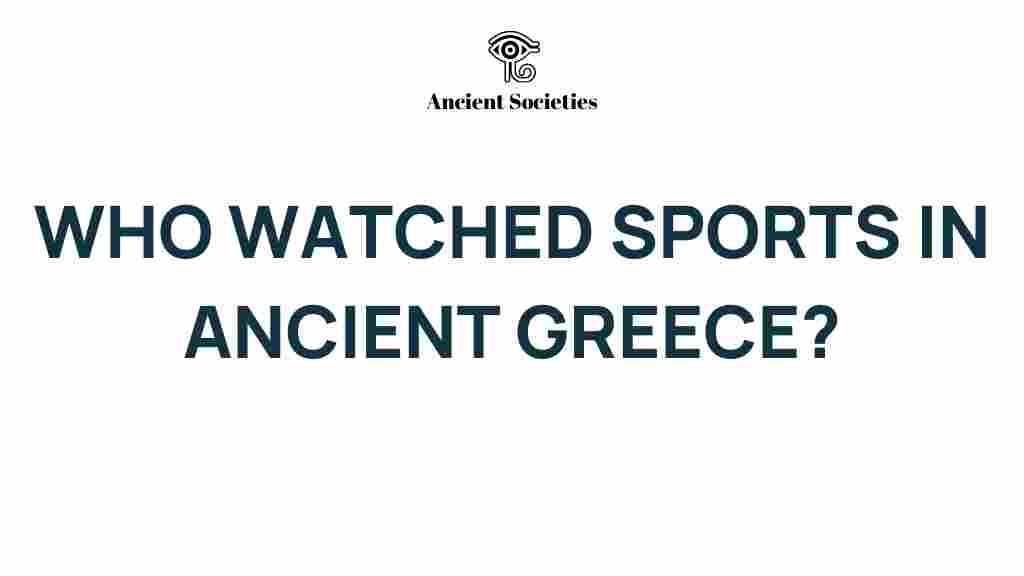Ancient Greece: The Spectators of Ancient Greece and Why They Watched
The rich tapestry of Ancient Greece is woven with threads of sports, culture, and history, where the passion for athletics blossomed into a significant aspect of society. At the heart of these exhilarating events were the spectators—individuals whose enthusiasm and engagement transformed athletic contests into grand spectacles. This article delves into the identity of these spectators, exploring their motivations for attending the games, the cultural significance of their presence, and how these ancient sporting events shaped Greek society.
The Role of Spectators in Ancient Greek Sports
The role of spectators in Ancient Greece cannot be overstated. They were not mere bystanders; they were integral to the fabric of the games. The spectators included a diverse mix of citizens, from the elite to the common man, and their presence played a crucial role in the overall atmosphere of the events.
- Integration of Society: Spectators came from various social classes, which helped to promote a sense of unity and community.
- Political Significance: Large gatherings of spectators often aligned with political events, where the games served as a platform for political expression and social commentary.
- Cultural Identity: The spectators were a reflection of Greek identity, with their participation reinforcing cultural values and traditions.
Why Did Spectators Attend the Games?
Understanding why spectators flocked to the games in Ancient Greece is essential to appreciate the broader cultural context. Several factors motivated their attendance:
- Entertainment: The primary reason for attending was entertainment. The thrill of competition, the display of athletic prowess, and the communal experience provided a unique form of entertainment.
- Cultural Festivals: Many games were part of larger religious festivals, such as the Olympic Games, which honored the gods. Attending these events was a religious duty and an opportunity for spiritual connection.
- Social Interaction: The games provided a venue for socializing, networking, and forging relationships. It was a chance for people to meet, discuss, and engage in communal activities.
- National Pride: Spectators often supported their city-states, cheering for local athletes and reveling in their victories. This fostered a sense of pride and identity.
The Spectacle of the Games
The Olympics and other athletic competitions were grand events that attracted thousands of spectators. The history of these games reveals much about the values and norms of Greek society.
- Olympic Games: Established in 776 BC, these games featured various athletic competitions, including running, wrestling, and chariot racing, and attracted spectators from all over Greece.
- Pythian Games: Held in honor of Apollo, these games included musical and poetic competitions along with athletic events, showcasing the multifaceted nature of Greek culture.
- Nemean and Isthmian Games: These local competitions were also significant, with their own particularities and traditions, further enriching the sports culture of Ancient Greece.
Attending the Games: A Step-by-Step Process
For those eager to experience the thrill of the games in Ancient Greece, the process of attending was quite an event in itself:
- Preparation: Spectators would prepare for the games, often traveling long distances to reach the location, carrying food and supplies for the journey.
- Housing: Upon arrival, spectators would seek accommodations, often in tents or shared lodgings, creating a vibrant atmosphere filled with excitement.
- Gathering at the Stadium: The day of the games would see large crowds converging at stadiums, where they would find their spots to cheer for their favorite athletes.
- Participation in Festivities: Apart from the competitions, spectators would engage in various festivities, including feasts, music, and theatrical performances.
Challenges Faced by Spectators
Despite the excitement, attending the games in Ancient Greece was not without its challenges:
- Weather Conditions: Extreme heat or rain could affect the experience, making it uncomfortable for spectators.
- Crowded Spaces: With thousands of attendees, the stadiums could become overcrowded, leading to a chaotic atmosphere.
- Travel Difficulties: Long journeys on foot or by cart could be treacherous, especially for those traveling from distant city-states.
Social Impact of Spectatorship
The presence of spectators at athletic events had lasting effects on Ancient Greek society. Their participation helped to:
- Reinforce Social Hierarchies: The interactions among different social classes at the games illustrated the societal structure of the time.
- Promote Civic Identity: Spectatorship was tied to civic pride, with people identifying strongly with their city-states through the athletes they supported.
- Influence Art and Literature: The games inspired countless works of art and literature, reflecting their significance in the cultural landscape of Ancient Greece.
The Enduring Legacy of Ancient Greek Spectators
The legacy of the spectators in Ancient Greece endures to this day. Their enthusiasm and engagement laid the groundwork for modern sporting events and the culture of spectatorship. The Olympic Games, revived in the 19th century, echo the spirit of those ancient contests, continuing to bring together people from around the world to celebrate athletic excellence.
Moreover, the principles of fair play, competition, and community engagement that were fostered in Ancient Greece remain relevant in today’s sports culture.
Conclusion: The Cultural Significance of Spectators in Ancient Greece
The spectators of Ancient Greece were more than just onlookers; they were vital participants in a cultural phenomenon that united people across city-states. Their reasons for attending—from seeking entertainment to fulfilling civic duties—speak volumes about the values and norms of their society. As we reflect on the history of sports and athletics in Ancient Greece, we must recognize the integral role of spectators in shaping this vibrant cultural heritage.
For those interested in a deeper exploration of the history of the Olympics and their impact on modern society, consider visiting this resource. You can also learn more about the cultural implications of sports in Ancient Greece through this article.
This article is in the category History and created by AncientSocieties Team
